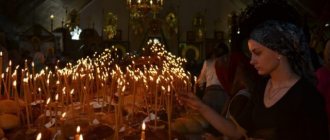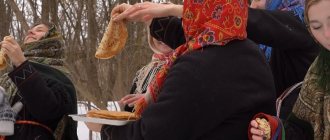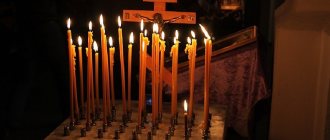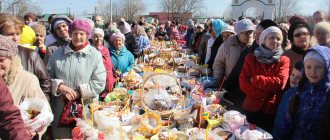Forgiveness Sunday is a Christian holiday. This is the last day of Maslenitsa and the last day before the start of Lent. On this holiday, we must ask for forgiveness from those we have offended and forgive our offenders. The main words on this day: “Forgive me” - “God will forgive, and I forgive.” The main goal of the holiday is to awaken bright and sincere feelings in people, the desire for good deeds.
Forgiveness Sunday in 2022 is celebrated on March 14. The date of the holiday changes every year depending on the date of Easter. Forgiveness Sunday is celebrated on the seventh Sunday before Easter - the last Sunday before Lent.
history of the holiday
At the beginning of Christianity, monks in Egypt left the temples before Lent to retire in the desert for 40 days and prepare in prayer for the Easter holiday. Life in the desert was full of dangers, and many monks never returned. They understood that their meeting could be the last. Therefore, we sincerely said goodbye and asked each other for forgiveness. Over time, this tradition spread to Christianity. This is how the holiday of Forgiveness Sunday arose.
The Story of the Publican and the Pharisee
Many unchurched people are perplexed and do not understand why they should ask for forgiveness: they live correctly, do not kill anyone, do not take someone else’s property, and do not do anything bad. This is where we remember the story.
Parable of the Publican and the Pharisee
The Pharisee lived righteously, prayed, and fasted on Wednesdays and Fridays, so he considered himself more correct and smarter than others. The publican served the invaders, collecting taxes from the people, for which they hated him fiercely. He understood his vile situation, so he constantly prayed to God for forgiveness.
As a result, the Almighty heeded the prayer of the Publican and rejected the request of the proud Pharisee, who was trying to exalt himself above others.
About sins:
- About anger
- About slander
- What is laziness and how to deal with it
Traditions and rituals
On Forgiveness Sunday, services are held in churches. After evening prayer, the priest and parishioners ask each other for forgiveness. After the end of the service, it is customary to give alms to those in need.
On this day, people ask their family, friends, and deceased relatives for forgiveness and let go of grievances.
Forgiveness Sunday ends Maslenitsa. On this day, the solemn farewell to winter and preparation for Lent ends. As throughout Maslenitsa week, housewives bake pancakes. Young girls tell fortunes about their betrothed, wish fulfillment.
People honor the memory of deceased relatives and visit their graves in the cemetery.
There is a tradition of going to the bathhouse to wash away all sins.
Russian customs
- On the holiday of Forgiveness Sunday, it is customary to visit relatives’ graves and order remembrance for the departed at the Liturgy and memorial service.
- In ancient times, on this day it was customary to attend divine services, confess sins, and receive communion.
- According to custom, people kissed three times during mutual forgiveness, hence the holiday received the popular name “kisser”.
- First of all, the younger ones ask for forgiveness before the older ones.
- In some families, an old tradition has been preserved: in the evening, household members sit around the table, and the father sits on a separate chair. Each family member approaches him in order of seniority with a request for forgiveness of all the bad deeds he has committed, after which the father himself asks for forgiveness from each family member.
- A person must find the strength to forgive and forget grievances, otherwise unforgiveness, especially on such a day, is a great sin.
- On Forgiveness Day, it is customary to eat 7 times, and the remaining food can only be removed the next day.
How to spend a holiday
- Ask for forgiveness from loved ones and acquaintances, forgive grievances
- Do a good deed - give up your seat on public transport, feed a homeless animal, carry an old woman across the road, etc.
- Give alms to those in need
- Go to church for a service and pray
- Spend the day with your family
Is it possible to perform on Forgiveness Sunday:
Baptism The Church does not prohibit baptizing a child on this day.
Wedding You can get married on this holiday. However, it is better to refuse lush festivities. After all, this is the last day before Lent.
Wedding You cannot get married on this day. The sacrament of weddings is not performed during Cheese Week - Maslenitsa.
The Importance of Forgiveness
Those who have carefully studied the Gospel know how kind the Savior was.
He forgave all people, even his executioners who tortured him. Many people believe that apologizing and forgiving is not so important, because there are actions that cannot be forgiven. For example, betrayal. These are not necessarily any crimes. It’s just betrayal, treason, it’s much more difficult to forgive. For this purpose, there is Forgiveness Sunday, when every person can break the circle of misunderstanding and disagreements. Many do not accept Forgiveness Sunday, believing that nothing good will come of forgiving everyone. The Church believes that grievances torment both sides. The offended person constantly worries, trying to understand the reasons for what happened, torments himself, gets angry at the offender and wishes him bad things. The offender is troubled by his conscience, and he constantly thinks about how to correct the situation. This is especially true for serious disagreements, when people cannot reconcile for a long time.
How to ask for forgiveness and forgive
You need to ask for forgiveness first of all from those whom you really offended. It is better to do this in person. If this is not possible, by phone or in writing. Ask for forgiveness sincerely and from the bottom of your heart. Remove your arrogance and pride. It is not necessary to formulate a specific guilt. You can simply say, “Forgive me.” The interlocutor will understand everything anyway. Keep your mistakes in mind and promise yourself not to repeat them again.
Forgive openly and consciously. Kiss your interlocutor on the cheek and say: “God will forgive, and I forgive!”
The ritual of forgiveness is necessary in order to improve relationships with others, admit your guilt and let go of grievances.
The Spiritual Meaning of Forgiveness
The main goal of this day is mutual forgiveness. It is necessary to realize your sinful nature, which brings pain and suffering. It is necessary to understand that only God is a judge, only He can punish and have mercy.
It is important to go through personal pride, humble your pride, find the strength to ask for forgiveness and forgive the offender. If you do not have the strength to forgive, then you can turn to the Lord, honestly admitting your weakness, and ask Him for forgiveness for this person.
What can you eat on Forgiveness Sunday?
Forgiveness Sunday precedes Lent. This is the last day when you can eat eggs, milk, cheese, butter, sour cream. Meat products are prohibited.
On this day, housewives bake pancakes with cheese fillings and serve them with sour cream or sour cream. Traditional holiday dishes: dumplings, pies with cottage cheese, cheesecakes.
The family should sit down to the table seven times, corresponding to the number of weeks of Lent. Drinking alcoholic beverages during a holiday meal is not recommended. In the evening, all leftover food should be thrown away or given to pets, and then the dishes should be washed thoroughly.
What is another name for the holiday and why?
Cheese week - comes from the phrase “I let go of cheese.” On this day, dairy products and eggs are allowed for the last time before Lent.
Remembrance of Adam's expulsion - on this day, Adam's expulsion from paradise for committing a sin is remembered.
Pagan customs
There are many rituals associated with Forgiveness Sunday, many of which belong to pagan times.
The ancient Slavs celebrated Maslenitsa - the Day of Farewell to Winter; its date coincided with the Orthodox Cheese Week. After the Baptism of Rus', this day was transformed into Forgiveness Sunday, and the joyful customs of these holidays were woven together.
In ancient times, the Slavs very widely, violently and wildly celebrated the farewell to winter, which, according to them, brought the long-awaited beginning of spring closer. On this day, people staged noisy games, dances, rode sleighs, swings and carousels, ate pancakes and burned the Maslyanitsa effigy.
Pancakes were considered a symbol of the holiday; they looked like the warm summer sun. After all, even the origin of the celebration was directly related to their baking. Pancakes were prepared throughout Cheese Week, because at this time you can no longer eat meat. According to custom, the first pancakes baked were to remember deceased relatives at a large family table, and after a home meal, the pancakes were taken to the graveyard to the graves or distributed to the poor on the street for remembrance.
Maslenitsa - Day of farewell to winter
Maslenitsa carried elements of the cult of fertility. The earth came to life, was saturated with the last winter snow, and filled with strength. Maslyanitsa rituals were intended to consecrate the land so that it would give a generous harvest, which was considered the main value for the peasants of that time.
The culmination of the festive festivities was the burning of the effigy. It was built on the Monday of Maslenitsa week from straw and old rags, seated on a sleigh and left on a hill, where on Sunday evening high bonfires were lit for the residents of neighboring villages to see.
If the scarecrow was taken outside the village, then this procession looked like a real carnival: ahead of the procession walked a guy dressed in matting and depicting a priest, waving a bast shoe like a church censer. Following the “clown” ran all the villagers, young and old, with noise, uproar and antics.
Lighting fires was intended to quickly awaken spring, and jumping over them was considered a kind of cleansing rite for the pagans.
After burning the effigy, people returned home and went to bed. In the morning, the villagers collected the ashes left from the fire and scattered them in the field. It was believed that by doing so they attracted a rich harvest.
The Orthodox Church has always had a negative attitude towards the pagan traditions of celebrating Maslenitsa.
In the Orthodox tradition, Maslenitsa is a preparatory week before the long Lent. These days, Orthodox Christians no longer eat meat, but still eat dairy products and eggs. Therefore, the tradition of baking pancakes is very suitable for this week. But do not forget that pancakes are just food, and not a symbol of the Sun.
Orthodox Christians should not participate in burning effigy and other pagan religious rituals. All of them are built on superstitions that have nothing to do with Christianity.
More about superstitions:
- About everyday superstitions
- Superstitions in the Church
- About fortune telling at Christmas
Fortune telling on Forgiveness Sunday
On this holiday, girls make fortunes about love, their betrothed, and the near future. The most popular is fortune telling using pancakes. Tell fortunes while baking pancakes. Pay attention to how the first pancake turned out:
- with smooth edges - to a quick and happy marriage, uneven - to possible problems in family life;
- fried in the middle - the husband will be faithful, on the sides - walking;
- a ruddy pancake means health, a pale pancake means illness;
- a thin pancake portends an easy year, a thick one - difficulties and a lot of work.
What is wrong to do on Forgiveness Sunday
You cannot take Forgiveness Sunday lightly. If you don’t accept it, then it’s better to just skip it, while listening to those who come to sincerely apologize to you. There is no need to insult even your enemies with jokes or disdain, because people, having opened their souls, come to you sincerely. A frivolous attitude towards the impulse of others to ask for forgiveness, first of all, will work against the joker.
Lying is a sin, therefore, if for some reason you cannot forgive the person who has offended you, it is better to tell him about it honestly and delicately.
Don't be rude or insult people who have come to apologize to you, even if they are your worst enemy. Situations are different, and sometimes resentment prevents forgiveness, but you need to listen to the person in any case.
Everyone asks for forgiveness on this day, regardless of age . If a young child apologizes to you, listen carefully and respond as an adult so that they understand the importance of the moment.
If you have not been forgiven , do not wait for the next Forgiveness Sunday, approach the person after some time and try to apologize again.
Short congratulations
***
I sincerely apologize for all the insults and mistakes I once committed. I do not hold evil in my heart, therefore I sincerely apologize for all my misdeeds and sins. May God grant you happiness and health, protect you from severe suffering and all kinds of troubles!
***
I ask you to leave grievances in the past so that you can live happily and peacefully. Open your soul to love, mercy and forgiveness. I apologize for the pain, misunderstanding, and rudeness caused. I want everything to be wonderful for you. I'm sorry!
***
Today, with all sincerity, I ask you not to hold a grudge against me. Let go of all grudges so that your soul becomes clean, bright and renewed. I want to live in peace with you, so forgive me if it was wrong. Smile at the new day, let positive emotions into your heart, don’t get angry!
Photo: pixabay.com
SMS congratulations
***
I ask you to forgive me for everything, for the pain and for the doubts. I don't want to do evil. Happy Forgiveness Sunday!
*** You smile, don’t be upset, Live, don’t harbor insults in vain. Forgive me, don't be offended. Happy Forgiven Resurrection to you!
*** Happy Forgiveness Sunday! Forgive me soon, forgive me all my sins, don’t live in resentment. Please do not judge strictly, I want to be in peace with you!
Photo: pixabay.com
Unusual congratulations in prose
***
On Forgiveness Sunday, do not try to hold within yourself any resentment or desire for revenge. Live a hype, positive, fun life. Be a real sweetheart, know how to forgive, so that you and everyone around you will feel better. Take advantage of the opportunities that open up, always stay in “prime time” mode so that happiness is nearby! I wish that kind emoticons accompany you everywhere, lifting your spirits. Forgive me for all!
***
Let there be no room in your soul today for evil thoughts, troubles and resentments. Please forgive me for my bad manners and past sins that torment my heart. Let's reboot the relationship so that we can live smartly and without any bummers. Don’t worry, learn to forgive, and then the world around you will become brighter and more positive. I wish you continuous happy endings. Happy Forgiveness Resurrection!
***
If there was something inappropriate on my part, I'm sorry! Let sorrows and grievances be forgotten, giving way to happiness and forgiveness. I wish you to live with faith, believe in the best, and receive only kind words and pleasant messages from good people in private. Open yourself to light, positivity, mercy, and let everything be ice. Happy Forgiveness Resurrection!
Photo: pixabay.com
Beautiful congratulations in verse
***
I want to ask for forgiveness, Since there was once evil. Forget about your sins, May you always be lucky.
Don’t harbor grudges in your heart, Try not to be discouraged, Just live in harmony, Stay positive.
Part with your anger, Let go of all your sins easily, Suddenly it becomes good, You don’t have to be sad anymore!
***
I sincerely appreciate you, I adore you and love you. And on Forgiveness Sunday I ask forgiveness for everything.
If the resentment is hidden in you, let it be forgotten. Don't be angry with me, then life will become easier!
Don’t hold grudges anymore, live positively. May happiness surround you, May your heart never be sad!
***
Happy Forgiveness Resurrection! Drive away doubts, Forgive me sincerely, Do not keep grief inside.
Let's always be friends with you, Never getting upset. After all, there is already a lot of evil in the world, I want happiness to suddenly come,
In a moment of resentment, everything was forgotten, It was fun for you. Let kindness live in your soul, And God will save you from troubles!
About the holiday
Forgiveness Sunday: who and how to ask for forgiveness correctly
Broad Maslenitsa 2022: history, traditions, fun and signs
Spring time is preceded by Maslenitsa - one of the oldest Slavic celebrations. Maslenitsa week has a deep history, strict traditions and signs. How to properly celebrate Maslenitsa 2022, why you need to eat pancakes and how to attract good luck with love, read the material 5-tv.ru.
What date is Maslenitsa in 2022?
Maslenitsa does not have a specific date and falls on a different date every spring. This “movement” of Maslenitsa week is connected with the fact that, according to tradition, in Rus' people had fun and ate pancakes before the start of the long and strict Lent, which, as you know, also “changes” the dates every year.
In 2022, Maslenitsa will begin on February 28 and will last until March 6.
You can independently determine the exact dates for the start of Maslenitsa celebrations if you know the date of Easter this year. To do this, you need to move back on the calendar exactly 56 days or 8 weeks - 48 days of Lent itself and another week of Maslenitsa are subtracted.
Maslenitsa week - 2022 by day
Each day of Maslenitsa week has a name and purpose. What is permitted to be done on Monday is not permitted to be done on Friday. Strict adherence to Maslenitsa traditions, as our ancestors believed, protected a person for the rest of the year. During this period, both old and young baked pancakes, remembered the dead, gathered families, forgave enemies and gave each other gifts.
Maslenitsa week is usually divided into two parts - narrow Maslenitsa and wide. In the first, it was still possible to do housework, but in the second, it was necessary to completely indulge in fun and put off all worries and matters for later.
Each day of Maslenitsa has a special meaning. Of course, in modern society they no longer adhere to all traditions, but it is worth familiarizing yourself with them:
Monday - Maslenitsa Meeting
On the first day of Maslenitsa week, they made a scarecrow from straw and old things, built slides and snow forts, and hung swings.
The housewives began baking pancakes. The first pancake was always treated to the poor or needy. Some left it near the house - to remember deceased relatives. The rest of the baked pancakes should have been treated to relatives who came to visit, and over the meal they should have discussed the upcoming celebration of Maslenitsa and the upcoming matchmaking.
Tuesday - Flirting
The second day of Maslenitsa week was devoted entirely to matchmaking and bride viewing. This is where the name came from - girls flirted with guys. Young people in Rus' went from house to house and chose brides. The girls performed rituals to attract their betrothed. If everything went well, the wedding was scheduled for Krasnaya Gorka, immediately after Easter.
Wednesday – Lakomka or Mother-in-law’s pancakes
The third day of Maslenitsa week is the height of the holiday. Housewives bake pancakes. Traditionally, on Wednesday, sons-in-law visited their mother-in-law. They greeted the newlyweds with a stack of freshly baked pancakes, generously sprinkled with butter. By the number of treats on the table one could judge what kind of attitude the son-in-law had earned over the past year.
Thursday - Razgulay
The beginning of Broad Maslenitsa. Pancakes flowed like a river. Music and laughter were heard from everywhere: people came out to take part in fun and festivities. A scarecrow of Maslenitsa was placed on a pole in the center.
The girls danced in circles and swung on swings, and the boys competed in strength and dexterity - tug of war, fist fights, climbing an ice pillar and, of course, capturing and defending a snow fortress. Buffoons sang in the streets and mummers walked.
The celebration continued until the evening and ended with jumping over the fire.
Friday - Mother-in-law's party
Unlike Wednesday, when mothers-in-law waited for their sons-in-law for pancakes, on this day parents came to pay a return visit to the newlyweds. The daughter baked pancakes for the treat, and her husband showed his respect to the guests in every possible way.
Saturday - Sister-in-law's gatherings
Young married women invited their husband's sisters and unmarried friends to visit. The hostess gave the girls gifts and treated them to pancakes. Those gathered held fortune telling for the future.
Sunday - Forgiveness Sunday
The last day of Maslenitsa week and the end of the entertainment. On this day, they burn an effigy of Maslenitsa on the highest hill and go to the cemetery to remember their dead relatives.
Sunday is reserved for forgiveness. People ask each other for forgiveness and forget the grievances of the past. According to tradition, when people met, they said to each other: “Forgive me,” and in response they heard: “God will forgive you.” This is done to begin Lent without thoughts aggravating the soul.
History and traditions of Maslenitsa
The history of Maslenitsa goes back centuries. Bright, noisy, cheerful and satisfying Maslenitsa combines the folk traditions of Russian culture and the deep meaning of the Christian faith.
The holiday appeared in pagan Rus'. Initially, it was a farewell to winter and a welcome to the imminent arrival of spring. A person’s life and prosperity at that time depended on the season and weather outside the window. After a hard, cold and often hungry winter, people sincerely rejoiced at the warming weather and waited for the cattle to be able to eat green grass, and for the table to have plenty of food again.
Initially, not pancakes were baked on Maslenitsa, but gingerbread. In addition to them, jelly was placed on the table. Culturologists suggest that the very first Pancake week pancake was made from jelly; this happened in the 9th century. This is how pancakes found their way into the Russian home kitchen. However, pancakes were still far from their finest hour.
The fact is that the main Maslenitsa dish for a long time was considered to be “sweet brushwood” cookies. Pancakes became the main symbol of Maslenitsa only seven centuries later. According to popular belief, people noticed the pancake’s resemblance to the sun and made it the main dish of the Maslenitsa table.
In those distant times, Maslenitsa was called Komoeditsa from the word that was then used to call a bear (Koma. - Ed.). The animal was considered one of the forms of the pagan god Veles. The saying “The first pancake is lumpy” refers to the same bears. According to the then tradition, part of the first pancakes was given to the bears. People believed that in this way they could appease Veles and speed up the arrival of spring.
In addition to Veles, our ancestors revered Yarilo, the Slavic god of the spring Sun. In his honor, they baked cakes similar to the sun's disk and set fire to an effigy - Mara. It symbolized the death and birth of nature. The last pancake cooked during Maslenitsa week was thrown into the fire in order to appease the gods. One of them was always placed near the house. According to some sources, this was done to save the souls of the deceased, according to others - for the poor and vagabonds.
The tradition of eating dairy foods during Maslenitsa is due to the fact that at the end of March (which is when Maslenitsa was previously celebrated), cows calved in the villages, milk appeared on the tables, and with it sour cream and cottage cheese.
It was extremely unwise to slaughter livestock during this period, and the autumn reserves of meat had already been eaten long ago, so dairy foods and flour products were the main dishes on the table of the peasants.
Maslenitsa, which has survived to this day and is known to us, with all its attributes, was adapted by the Russian Orthodox Church in the second half of the 18th century and became a kind of compromise between pagans and clergy.
The holiday was set within a framework - to be held strictly before the beginning of spring Lent. The number of days was also reduced - from 14 to 7. The pagan overtones of Maslenitsa were somewhat smoothed out, and certain dishes were removed from the menu. But the fun remained practically untouched - the church condescendingly considered that after a hard winter and before a strict religious fast, the peasants should eat a hearty meal, have plenty of fun and let off steam.
Therefore, Maslenitsa is one of the most joyful folk holidays. Everyone could choose fun to their taste: sleigh rides, horseback riding or swings, catching geese, fist fights, ditties, songs, round dances, theatrical performances, snowball fights, sack fights, Maslenitsa pole and much more, depending on the region of celebration.
However, the main thing that young people needed to do in time for Maslenitsa was to find a soul mate. Having fun in the fresh air just helped to look for a mate and assess the chances of success. The girls dressed up, and the guys tried to win the competitions in order to show themselves advantageously before the matchmaking.
Today, the celebration of Maslenitsa no longer has a pagan background. For modern people, it comes down to eating hearty and sweet pancakes, partying and waiting for the warm weather to arrive soon. And the expression “The first pancake is lumpy” is now interpreted as baking the first pancake not in the best way: with burnt spots, lumps and torn edges.
The meaning and significance of Maslenitsa
The cheerful traditions of Maslenitsa hide the deep meaning of the holiday. Of course, Maslenitsa is a farewell to winter and a welcome to spring. Previously, Maslenitsa was celebrated on the day of the spring equinox - March 21. And after the freezing winter with its illnesses, cold, hunger and hardships, this was truly a victory of life over death and a new beginning. And the pancake, similar to the sun, personified the cyclical nature of life and the seasons of the year.
In spring, the female image of fertility and new life came to the fore. The land was consecrated for a good harvest, they prayed for healthy offspring in the family and good offspring in the barn.
With the advent of Orthodoxy, Maslenitsa became the threshold of Lent. A kind of period for the joy of the body, but everyone remembered that what was more important was the joy of the soul. Therefore, Maslenitsa week with songs, jokes, hearty food and entertainment ends with Forgiveness Sunday. The popular proverb reminds us of this: “Feast and walk, woman, on Maslenitsa, but remember about fasting.”
How to eat pancakes on Maslenitsa
The etiquette norms of Ancient Rus' differ from the way well-mannered people are accustomed to behave at the table today. We rarely eat with our hands and use cutlery more often. That’s why many people eat pancakes on Maslenitsa armed with a knife and fork. According to ancient beliefs, you need to eat Maslenitsa pancakes with your hands, and using knives and forks will bring disaster to the eater.
Today, the tradition of eating the main Maslenitsa dish with hands is supported by an increasing number of people. More often, Maslenitsa is celebrated with family or warm company during folk festivals. Maslenitsa towns line the streets with pancake baking, hot tea, coffee and various additives.
Is it possible for an Orthodox Christian to celebrate Maslenitsa?
Orthodox Christians are often interested in the question: is it possible for a believer to celebrate Maslenitsa? Considering the pagan roots of the festival, doesn’t eating pancakes during Maslenitsa week go against the canons of Orthodoxy?
According to the clergy, there is nothing wrong with taking part in Maslenitsa festivities or eating pancakes. The only important thing is how a person perceives this holiday. Modern traditions of celebrating Maslenitsa exclude pagan rituals such as sacrifices or worship of totems. Today Maslenitsa is simply a hearty holiday, headed by fun and general joy.
For a true Christian, Maslenitsa is a solemn farewell to winter and a welcome to the spring season. And also eating pancakes before Lent, meeting with relatives and folk festivals.
What not to do on Maslenitsa
For a modern person, food comes first during Maslenitsa week. However, in Rus' during this period it was customary to eat too much. And with the advent of Christianity, Maslenitsa began to be perceived as the last well-fed week before Lent.
However, even during this period there were and are their prohibitions. They concerned both food and behavior. On Maslenitsa you cannot:
- Eat meat. In ancient times, Maslenitsa was called meat week or cheese week. During this period, it is forbidden to eat meat and meat products. With the advent of Orthodoxy, our ancestors began to give up meat in preparation for fasting. In addition, few peasants could boast after a hungry winter of such a large number of cows, goats, chickens or sheep to afford meat at the beginning of spring.
- Be sad and despondent. It was believed that anyone who, for some reason, refuses to have fun and participate in the Maslenitsa chaos will attract trouble and incur great problems and sorrows.
- Be greedy or refuse to help relatives. Maslenitsa is a period of generosity.
- Skimp on food for guests. The Maslenitsa table should be rich. The more pancakes and different fillings there are, the more satisfying and financially easier the rest of the year will be.
- Cutting pancakes with a knife is a bad omen. You can carefully separate the pancake with your hands or a fork.
- Do housework, clean, repair something, and so on. If guests are expected to arrive, then you should take care of the cleanliness and order of the house in the first three days of narrow Maslenitsa. Wide Maslenitsa should be dedicated exclusively to joy and fun. But the troubles will not go away.
- Swear, get angry and use foul language. A showdown is not the best time. While everyone around you is having fun and celebrating, you need to do the same, and on the last day of Maslenitsa you must forgive everyone and ask for forgiveness in order to help yourself and others begin Lent with a clear conscience.
What can you eat on Maslenitsa?
In addition to pancakes, milk and dairy products, during Maslenitsa week you are allowed to eat fish and its derivatives. Fish and seafood are also allowed to be consumed on some days of Lent. According to some theologians, this permission stems from the fact that the apostles were fishermen.
Maslenitsa signs: attracting luck, love and money
Our ancestors knew how to distinguish the signs of fate, which they used to make true predictions for the whole year. Girls in Rus' especially watched how pancakes turned out for Maslenitsa week. It was believed that you could see your future in them.
- If the pancake turns over easily, it means the rest of the year will go well. If it is difficult to separate from the frying pan, a difficult period awaits the person.
- If an unmarried girl cannot separate the pancake from the frying pan on Maslenitsa, she will not see marriage for another three years.
- When an unmarried girl produces pancakes with smooth edges, this indicates that the marriage (or relationship) will be successful.
- Thin pancakes on Maslenitsa predicted an easy life, but our ancestors saw thick pancakes as an omen of difficult trials.
- If you eat peas on Wednesday and pancakes on Thursday, you will have plenty of money for the rest of the year.
- The more pancakes you bake for Maslenitsa, the more satisfying and happier your year will be.











